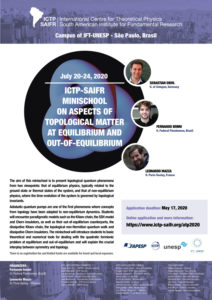Minischool on Aspects of Topological Matter at Equilibrium and Out-of-equilibrium
July 20-24, 2020 POSTPONED
São Paulo, Brazil
ICTP-SAIFR/IFT-UNESP
Due to COVID-19, the minischool has been postponed. The new dates will be defined soon.
Home
Since the pioneering works of D. Thouless, F. D. M. Haldane and J. Kosterlitz, awarded with the Nobel prize in 2016, one of the most exciting topics in condensed matter physics has been the search for quantum states of matter whose complete description requires the use of mathematical tools known as topological invariants.
The enormous progress in the field of topological matter includes the classification of topological insulators and superconductors, as well as an understanding of the interplay between symmetry and topology. More recently, the investigation of out-of-equilibrium dynamics of quantum systems is becoming more and more established, from non-Hermitian quantum walks to Majorana zero-damping modes.
The aim of this minischool is to present topological quantum phenomena from two viewpoints: that of equilibrium physics, typically related to the ground state or thermal states of the system, and that of non-equilibrium physics, where the time-evolution of the system is governed by topological invariants.
Adiabatic quantum pumps are one of the first phenomena where concepts from topology have been adapted to non-equilibrium dynamics. Students will encounter paradigmatic models such as the Kitaev chain, the SSH model and Chern insulators, as well as their out-of-equilibrium counterparts, the dissipative Kitaev chain, the topological non-Hermitian quantum walk and dissipative Chern insulators. The minischool will introduce students to basic theoretical and numerical tools for dealing with the quadratic fermionic problem at equilibrium and out-of-equilibrium and will explain the crucial interplay between symmetry and topology. An outline of the subjects in this Minischool follow below:
————– Equilibrium topological physics: the basics ———————
– Ising chain and the topological Kitaev chain.
– Su-Schrieffer-Heeger (SSH) model;
– Affleck, Lieb, Kennedy and Tasaki (AKLT) model and the spin-1 Haldane phase;
– Topological Insulators / Integer Quantum Hall Effect;
– Toric Code – applications to Quantum Information and Computation;
– Chiral clock model and parafermions;
– Thouless pump.
————– Out-of-equilibrium topological physics ———————
– Thouless pump and quantized topological order parameter for mixed quantum states;
– Non-hermitian topological systems;
– Basics of quantum master equations for open-system dynamics;
– Dissipative preparation of topological Kitaev’s wire;
– Edge modes in dissipative systems;
– Dissipative preparation of Toric Code;
– Dissipative Chern insulators and some elements of dissipative topological field theory;
There is no registration fee and limited funds are available for travel and local expenses.
Announcement
Click here for online registration
Application deadline: May 17, 2020 POSTPONED
Lecturers:
- Sebastian Diehl (Institute for Theoretical Physics, University of Cologne – Germany)
- Fernando Iemini (Instituto de Física, Universidade Federal Fluminense, Niterói – Brazil)
- Leonardo Mazza (Laboratoire de Physique Théorique et Modèles Statistiques, Université Paris-Saclay – France)
Organizers:
- Fernando Iemini (Instituto de Física, Universidade Federal Fluminense, Niterói – Brazil)
- Leonardo Mazza (Laboratoire de Physique Théorique et Modèles Statistiques, Université Paris-Saclay – France)
Registration
Photos
Program
Additional Information
Visa information: Nationals from several countries in Latin America and Europe are exempt from tourist visa. The Brazilian government announced that effective June 17, 2019, a visitor visa (electronic or paper) will not be required for U.S. citizens to travel to Brazil for the purposes of tourism, business, transit and artistic and sportive activities, for stays of up to 90 days. Nationals from Australia, Canada and Japan can apply for an e-visa through VSF Global. Please check here which nationals need a tourist visa to enter Brazil.
Hotel recommendation: http://www.ictp-saifr.org/hotel-recommendations-2. Participants and Speakers whose accommodation will be provided by the institute will stay at The Universe Flat.
How to reach the Institute: The workshop will be held at ICTP South American Institute, located at IFT-UNESP, which is across the street from a major bus and subway terminal (Terminal Barra Funda). The address which is closer to the entrance of the IFT-UNESP building is R. Jornalista Aloysio Biondi, 120 – Barra Funda, São Paulo. The easiest way to reach us is by subway or bus, please find instructions here.
Yellow fever vaccination is recommended for travellers going to Brazil. Note that the vaccine needs to be taken at least ten days before the trip to be effective. Information: https://wwwnc.cdc.gov/travel/notices/alert/yellow-fever-brazil

